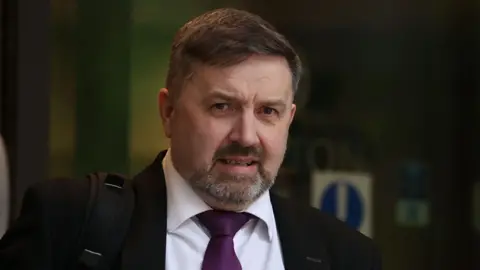Swann denies blanket do-not-resuscitate order during Covid
 PA Media
PA MediaThe former health minister Robin Swann has denied there was a blanket "do-not-resuscitate" order in place for sick patients in Northern Ireland during the pandemic, the Covid inquiry has heard.
Under NHS guidance, a Do Not Attempt Cardiopulmonary Resuscitation (DNACPR) order can be added to someone's medical notes after consultation with the patient or their family members.
Mr Swann told the UK Covid-19 Inquiry, it was "ill-founded" to suggest there was a "blanket response" as a policy in Northern Ireland.
The Covid inquiry is currently considering the impact on healthcare systems in England, Scotland, Wales and Northern Ireland.
'Unethical and unnecessary'
Mr Swann said he previously told assembly members, in response to a number of written questions, that he believed the orders were "unethical and unnecessary to deploy based on age or disability".
In response to a question from counsel to the inquiry, Nick Scott, the MP said he would have received "back-up documentation" when responding to assembly members questions confirming that orders were being "applied appropriately" and that "there wasn't a blanket response".
Mr Swann accepted he was aware of concerns from families about an increase in the number of DNACPR orders applied to patients being admitted to hospital.
He said "on all occasions" the orders should have been "negotiated and discussed, in regards to the individual and the family as well".
Covid hospital challenges
The former health minister also apologised for the way relatives of patients in hospital during the pandemic were "let down" by not getting information about their loved ones.
Giving evidence to the UK Covid-19 Inquiry, Mr Swann said it had also been a difficult situation for healthcare staff, who could not always provide updates.
He said there had been weaknesses in the communications systems and in the plans to improve these across health trusts and in hospitals.
"In regards to the staff who were working on wards and being able to provide that up to date information and data in regards to how a loved one... an update on their care on a ward wasn't always possible on a timely need," said the former minister.
"On the occasions that that did cause stress, I apologise that we weren't able to get it right every time.
"There were many wards, many healthcare workers who were providing that care, that information and were able to meet those needs."
"Could we have done more, could we do more? Yes, knowing what we know now in regards to the additional PPE, testing and all the rest of it," Mr Swann added.